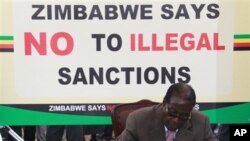Zimbabwean President Robert Mugabe Wednesday launched a campaign to collect the signatures of millions of citizens on a petition against sanctions imposed on him and other top ZANU-PF officials for alleged human rights violations and election rigging.
Critics of Mr. Mugabe and ZANU-PF said party militants forced thousands of citizens to attend the event at the Harare Agricultural Show Grounds, and many were bused in by the former ruling party, now sharing power with the Movement for Democratic Change.
The launch of the petition was held under the theme "Sanctions Do Kill." The president has blamed Zimbabwe's economic decline on the Western travel and financial sanctions imposed on him and his inner circle for nearly a decade. Most observers say that the country's plunge into poverty and hunger was caused by the fast-track land reform process Mr. Mugabe launched in 2001, misgovernance and corruption.
President Mugabe called for citizens to stop buying products of companies based in the countries imposing the sanctions, in particular Britain and the United States.
“Zimbabweans should with immediate effect boycott buying products of foreign-owned companies that operate here - the imposed unjust sanctions on us which are not recognized by United Nations," he said, adding, "We have to hit back.”
VOA Studio 7 correspondent Thomas Chiripasi reported from Harare.
Prime Minister Morgan Tsvangirai told reporters in a news conference at his home that he stayed away from the anti-sanctions rally because to attend would have legitimized ZANU-PF's 'hypocrisy' in failing to respect the terms of the Global Political Agreement signed in September 2008 to resolve an impasse following disputed elections.
There is no concensus in Harare over the impact of the targeted sanctions - some say they have been effective while others argue that they have dismally failed.
Political analyst Trevor Maisiri told reporter Blessing Zulu that sanctions have not worked and should be lifted as they are now hurting ordinary Zimbabweans.
ZANU-PF will not only be waging its anti-sanctions battle through the petition campaign. Sources in the party said it will also target local units of companies from countries which continue to maintain restrictions on President Robert Mugabe and nearly 200 others.
Party spokesman Rugare Gumbo said Swiss-owned Nestle Zimbabwe is among the firms targeted under the so-called indigenization program. Nestle angered ZANU-PF in 2009 by refusing to buy milk from Gushungo Holdings, a Mugabe family-owned dairy.
Gumbo said Mr. Mugabe has also expressed dismay about the operations of mining firms including South African-based Zimbabwe Platinum Holdings or Zimplats.
Harare owes Zimplats US$34 million which the Reserve Bank of Zimbabwe diverted from the firm’s hard currency account to fund operations of the former ZANU-PF government.
Gumbo said President Mugabe is serious about cracking down on local firms whose parent companies are based in countries imposing sanctions.
Employers Confederation of Zimbabwe President John Mufukare said the threats by Mr. Mugabe and his party to seize foreign-owned enterprises is shocking.
But London-based economic commentator Bekithemba Mhlanga said he doubts ZANU-PF will start expropriating companies. “Mugabe has tried over the years to use different cards towards general elections and now he is gambling on sanctions as a way of attracting voters to his party in case there is a poll this year,” Mhlanga said.
Meanwhile, US Deputy Assistant Secretary of State for African Affairs Susan Page was in Zimbabwe for a four day visit. She was expected to meet senior government officials, business leaders and civil society organizers in Harare and Bulawayo.
Embassy sources said Page has already met Prime Minister Tsvangirai and a request to meet with President Mugabe is still pending.
US Embassy spokesperson Sharon Hudson-Dean said that in Pages's meetings with senior officials she will in particular be discussing the recent surge in violence.
Page will also engage with Zimbabwea business leaders, Hudson-Dean said.




